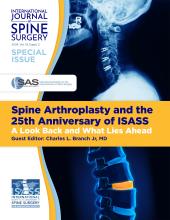ABSTRACT
Background Patient-reported outcome measures (PROMs) are critical tools used in the assessment and reporting of surgical outcomes. However, significant differences in PROM scores have not been shown to consistently correlate with clinical improvement from the physician or patient perspective. Defining a minimum clinically important difference (MCID) for PROMs offers interpretation of surgical outcomes with an emphasis on patient-centered feedback. The goal of this study was to define a MCID for the following PROMs in lumbar tubular microdecompression (LTMD) patients: the EuroQol-Five Dimensions (EQ-5D) index, Oswestry Disability Index (ODI), leg pain visual analog scale (VAS), and low back pain VAS.
Methods This study examined 235 index LTMD patients with PROMs collected at preoperative evaluation and 1-year follow-up. Using an anchor-based approach with patient satisfaction index, a receiver operating characteristic analysis was performed to define a MCID in the EQ-5D index, ODI, leg pain VAS, and low back pain VAS.
Results The patients had a mean age of 65.18 ± 12.81 years, and 47.7% were male. The MCID values for the EQ-5D, ODI, leg pain VAS, and low back pain VAS are 0.219, 15.0–16.5, 0.5, and 2.5–3.5, respectively.
Conclusions This study helps define a MCID for the EQ-5D index in LTMD patients. Given its ease of administration and economic relevance, further characterization of the EQ-5D index may warrant its use as a potential alternative or adjunct to the routinely collected PROMs following spine surgery.
Level of Evidence 3.
Footnotes
Disclosures and COI: This research did not receive any specific grant from funding agencies in the public, commercial, or not-for-profit sectors. The authors report no conflicts of interest.
- ©International Society for the Advancement of Spine Surgery







